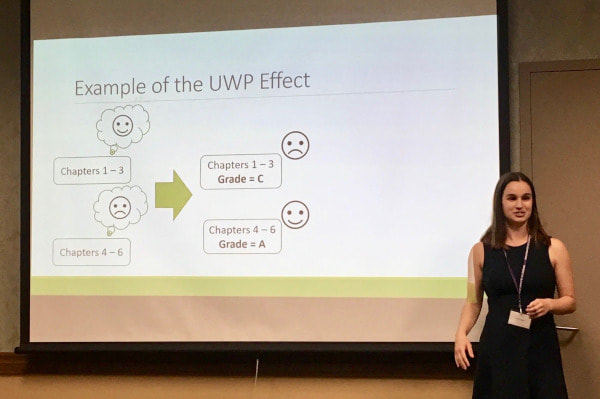The Underconfidence-with-Practice Effect as a Function of Imageability in a Metamemory Task5/10/2019
Event: Undergraduate Research Symposium
Date: May 18, 2019 Location: UCI Student Center Presenter: Rachel Smith Mentors: Grace Lin, Susanne Jaeggi Title: The Underconfidence-with-Practice Effect as a Function of Imageability in a Metamemory Task Abstract The present study is designed to better understand how well people perform on metamemory tasks. Metamemory is one’s awareness of their own thoughts and cognitive process. A particular pattern people exhibit on metamemory tasks is the underconfidence-with-practice (UWP) effect. The UWP effect states that participants are overconfident in the beginning of the experiment, but after the first block of trials, participants become underconfident. We aim to investigate the UWP effect in a betting paradigm. Participants (n = 51) saw a list of words that differed in imageability and placed a “bet” of judgement of learning (JOL) on each word based on how likely they thought they would recall the word. After twelve words were presented, participants freely recalled as many words as they could. Participants completed five blocks of words. A within-subjects 2 (measure: JOL and accuracy) x 5 (blocks) repeated measures ANOVA was done to assess the calibration of participants’ metamemory in the five blocks. Results show that the UWP effect was not present in our metamemory paradigm. There was a significant interaction between measure and block, but participants were overconfident for the first and last blocks (F(4,192) = 4.751, p < .001, η²p = 0.09). Participants bet and recalled significantly more imageable than unimageable words (F(2,100) = 58.2, p < .001, η²p = 0.538; F(2,100) = 31.54, p < .001, η²p = 0.387). Though the UWP effect had been robust in previous studies, our result could be due to our rather novel “betting” paradigm. Comments are closed.
|
Resources for:
|
|


